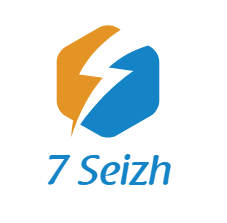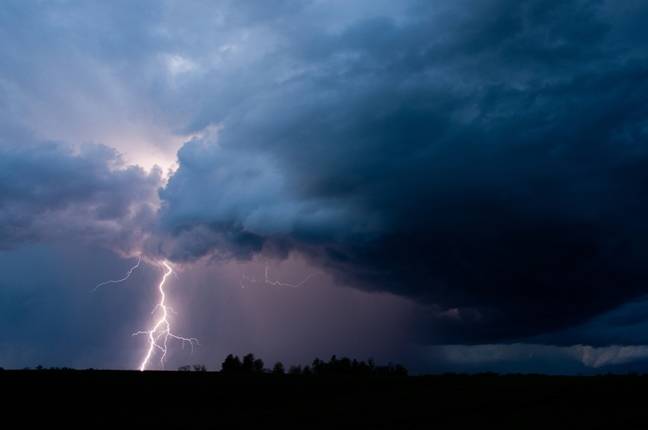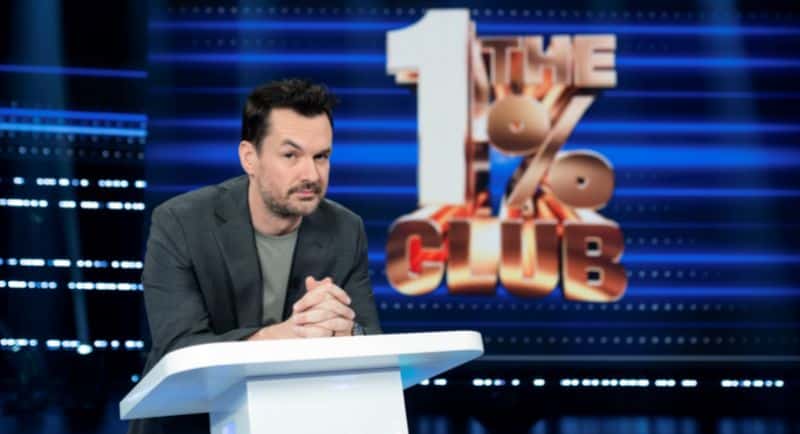Economy
Big tech companies’ biggest weaknesses emerged in 2021
Last year – perhaps more than ever – the world was powered by the big tech companies.
The families have stayed in touch via Whatsapp, Zoom and FaceTime. Remote working practices that were quickly adopted allowed companies to maintain their services without faltering. Main Street has shifted online at an unprecedented rate, as retailers of all sizes are finding new ways to sell to their customers.
But the pandemic has also highlighted some of the technology’s biggest weaknesses — with many coming to the fore in 2021.
Cyber security is in poor health

The sudden move to remote work last year sparked fears that cybercriminals could exploit poorly prepared networks. But it wasn’t until this year that the country felt the real impact of the digital attack.
In May Health Service Executive announces it has suffered a ‘major’ and ‘sophisticated’ ransomware attack, with criminals blocking access to their systems.
This has effectively made health, safety and environment disconnected, as hospitals have reverted to the old paper-based systems. This has caused a significant slowdown in its operations, resulting in delays and cancellations of appointments.
later report It found that the attack traced its origins to a breach eight weeks ago, when a phishing email was opened within the organization.
The attackers were helped by the « weak » IT system used in HSE, although it was also found that the organization missed many opportunities to deal with the problem before launching the full-scale attack.
Besides the clinical impact, the attack also had a cost of €100 million to the health authority.
As the year drew to a close, it was clear that the problems weren’t over yet, with Comp Hospital had to shut down its IT systems in December due to a cyber attack.
But this year it has also proven that digital attacks aren’t just a problem for large organizations – with Scam texts and phone calls become an almost constant nuisance.
Fraudsters have profited from everything from the pandemic to Brexit – with messages often focused on online banking, delivery notices or even customs duties.
The scammers also used an extra level of sophistication, as they were able to put their fake texts alongside legitimate messages from the likes of AIB and Bank of Ireland.
The devil is in Facebook data
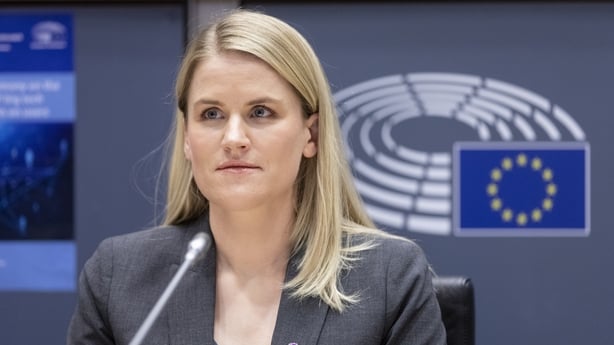
But it was an attack of a different kind that sparked a year of controversy for social media giant Facebook.
While all social media platforms have been grappling with the ‘fake news’ problem for years now, Covid-19 has underlined the ‘life or death’ nature of their efforts.
And in 2021, the biggest platform of them all faced detailed accusations of failing to stem the flow of misinformation.
Frances Haugen, a former employee turned whistleblower, claimed that after the 2020 US presidential election, the company shut down special systems designed to curb misinformation and abuse on its platform.
She said it helped fuel madness Riots at the US Capitol on January 6.
However, Ms. Haugen’s allegations about Facebook’s problems go far beyond US policy, with Whistleblowers who claim the company has a policy that has made executives sacrifice users in pursuit of profit.
This includes amplifying violent hate-filled content because it generated more engagement — and advertising revenue, she said. It also accused Facebook of ignoring its own research that younger users are negatively affected by their experiences with its apps.
Facebook rejected Ms Haugen’s allegations, and said the documents she presented as evidence had been taken out of context. It also noted the steps it has taken to address misinformation and abuse; and protect younger users.
However, it’s not just its content policy that has come under scrutiny this year – with its handling of user data also under the spotlight once again.
This included questions from Irish Data Protection Commission on data leakage of 533 million users, Prospect A fine of 36 million euros for processing personal data, cancel what she has Controversial facial recognition system.
All of this added an extra layer of toxicity to the Facebook brand — possibly fueling its October decision to Changed his name to « Meta »« .
However, the multiple controversies don’t seem to have done much to dampen the group’s appeal among users – b Profit boom And Significant growth planned for the next five years.
Europe doubles down in the Battle of Big Tech
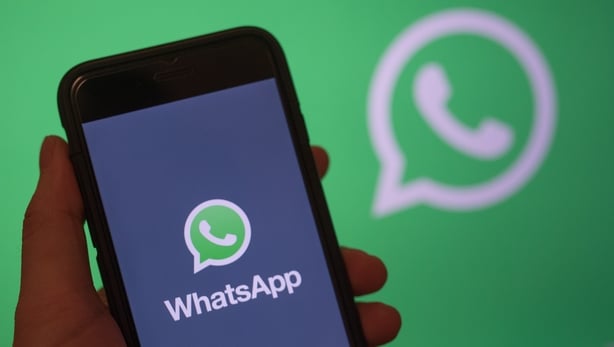
While Frances Hogan has pulled no punches in her criticism of Facebook, she has praised the European Union for its attempts to curb the power of big tech.
This can be seen most clearly in the financial penalties imposed on large companies for alleged violations of union rules – particularly those relating to the General Data Protection Regulations.
Designed to force companies to handle user data more carefully, it came into effect in mid-2018, but it’s already starting to have an impact this year.
Alongside Facebook’s proposed €36m fine, the Irish Data Protection Commission imposed a record A fine of 225 million euros on the Irish arm of the messaging service Whatsapp for violations of the General Data Protection Regulation.
Ireland’s DPC had originally proposed a €50 million fine to the company, but that was raised significantly after a review by the European Data Protection Council. Whatsapp choose Fine Challenge Allegation that it constitutes « the imposition of a criminal penalty ».
Meanwhile, Amazon It was found to be in violation of the General Data Protection Regulation by the Luxembourg data protection authorities, with a fine of 746 million euros.
The tech giant was also hit with a €1.13 billion fine in Italy – this fine for the alleged abuse of its market position.
and with the The European Union is currently making progress on the Digital Services Act and the new Digital Marketing ActMore pressure will likely be put on the big tech companies in the coming months and years.
processing problems

But the technology’s problems weren’t just digital – the engine of the entire industry continued to struggle in 2021.
Processor makers are starting to run into trouble for the first time in 2020, with the rapid transformation of supply chains and an unprecedented rise in demand. led to a global shortage of computer chips.
This not only affected the production of computers, tablets, smartphones, and servers – but also Completely separate sectors have become highly computerized, such as automakers.
Their problems continued into 2021, forcing major companies to delay and revise plans to launch their products, while also causing a backlog in the European car market.
The problem became so severe that it led to this High-level meetings at the White House, with European authorities are also trying to find ways to meet the challenge.
Officials in both the European Union and the United States agreed that there was a need to increase regional chip production to reduce dependence on Asia.
This should have a positive impact on Ireland, which is destined to be its home More production of Intel chips in the future, with 1,600 new jobs on the way to the L’Exlip campus.
It is also said that Ireland is competing for A separate factory operated by Intel which will produce chips for other companies, although it faces stiff competition from other European countries for this award.
But wherever Intel’s new facility goes, and whatever other chip production is being established in Europe or the United States, it is unlikely to do much to help the current shortage crisis.
The complexity and scale of chip-making facilities mean that it takes years to develop new sites — or for existing sites to dramatically increase production.
This means that it can be Some time before supply and demand balance again.
Broadband plan is behind schedule

It will be years before many Irish households have access to high-quality broadband, despite the seemingly ambitious plans of the National Broadband Scheme – as well as some private operators.
Contracts for the National Broadband Plan – which aims to bring high-speed connections to more than half a million homes – were signed in 2019.
In the past year, there have been positive signals coming from the company behind the rollout – National Broadband Ireland – and other things Looks like he’s on the right track in early 2021.
But as the year went by, problems began to arise.
In September, the Oireachtas . Transport and Communications Committee was informed The plan was six months behind schedule – But by October it was Regressed to eight months delay.
This means that after 22 months of operation, Just over 3,300 homes and businesses are connected to the network By early December.
But the good news for some is that fewer homes and businesses may have to wait for the NBI to get high-speed broadband, with many companies ramping up their fiber rollout.
In April, Air said its fiber-optic home service was so Available in 800,000 buildings across the country, and in August Announced plans to expand this to 200,000 more buildings.
In October, Ciro – the joint venture between ESB and Vodafone – announced a 620 million euros to expand its network It would bring connections to an additional 320,000 buildings.
Then in November, Virgin Media Ireland has said it will spend €200 million to modernize its networkWhich means that its customers will be able to take advantage of a full fiber service capable of much faster speeds than before.

« Spécialiste de la télévision sans vergogne. Pionnier des zombies inconditionnels. Résolveur de problèmes d’une humilité exaspérante. »
Economy
Le programme de conduite autonome de Tesla est une déception perpétuelle en termes de revenus
(Bloomberg) – L’écart entre ce que dit Elon Musk à propos de la commercialisation de la technologie de conduite autonome et ce que Tesla dira plus tard dans les documents réglementaires n’a jamais été aussi large.
Tesla a publié mercredi son rapport trimestriel 10-Q qui fournit un aperçu plus détaillé de la santé financière de l'entreprise. Pendant plusieurs années consécutives, Tesla a fourni des mises à jour régulières de ces données sur le montant des revenus qu'elle a reçus des clients et qui n'ont pas encore été entièrement reconnus. Une partie de ces revenus différés est liée à un produit en préparation : la conduite entièrement autonome, ou FSD, en abrégé.
Les revenus reportés des véhicules de Tesla s'élevaient à 3,5 milliards de dollars au 31 mars, soit peu de changement par rapport à la fin de l'année dernière. Sur ce montant, Tesla s'attend à reconnaître 848 millions de dollars au cours des 12 prochains mois, ce qui signifie qu'une grande partie des obligations de performance associées à ce qu'elle facture aux clients pour le FSD ne seront toujours pas satisfaisantes dans un an.
La société ne donne pas de détails sur ses performances médiocres, même si le titre du programme est connu pour être un abus de langage. FSD est un système d'aide à la conduite qui ne rend pas les voitures de l'entreprise autonomes ; Cela nécessite que les conducteurs vigilants gardent les mains sur le volant.
Dans ces documents, Tesla a également indiqué le montant des revenus différés réellement comptabilisés – et la société basée à Austin n’a toujours pas répondu à ses attentes. Il a reconnu 494 millions de dollars de revenus différés au cours des 12 derniers mois, soit moins que les 679 millions de dollars prévus il y a un an.
Ces chiffres ont pris encore plus d’importance à la lumière du ralentissement de l’activité automobile de Tesla et de l’accent mis par Musk sur le FSD. Le PDG a mis en place une exigence à la fin du premier trimestre, selon laquelle les employés devaient installer et démontrer un FSD à chaque client en Amérique du Nord avant de livrer le véhicule.
En fait, lors de la conférence téléphonique sur les résultats du premier trimestre de Tesla mardi, Musk a tracé une nouvelle ligne dans le sable : « Si quelqu'un ne pense pas que Tesla va résoudre le problème de l'autonomie, alors je pense qu'il ne devrait pas investir dans le secteur. entreprise. » « Nous le ferons, et nous le ferons », a déclaré l’exécutif.
Alors que Tesla a bénéficié au premier trimestre de la hausse des revenus FSD par rapport à l'année dernière, en raison de la sortie d'une fonctionnalité en Amérique du Nord appelée Autopark, les revenus totaux ont chuté de 8,7 % à 21,3 milliards de dollars. Il s'agit de la première baisse d'une année sur l'autre de l'entreprise en quatre ans et de la plus forte baisse en pourcentage depuis 2012.
Musk a donné le coup d'envoi de l'appel aux résultats de Tesla en qualifiant la dernière version de FSD de « profonde » et s'améliorant rapidement. La société a réduit le prix d’achat de la fonctionnalité ou d’abonnement pour l’utiliser sur une base mensuelle et propose également des essais gratuits. Le PDG a déclaré que la société avait eu des discussions avec un grand constructeur automobile au sujet d'une licence FSD.
« Encore une fois, je recommanderais fortement à tous ceux qui, je pense, envisagent des actions Tesla, de vraiment conduire FSD », a déclaré Musk à la fin de l'appel. « Il est impossible de comprendre l’entreprise si on ne la comprend pas. »
D'autres histoires comme celle-ci sont disponibles sur bloomberg.com
©2024 Bloomberg LP
Ouvrez un monde d'avantages ! Des newsletters utiles au suivi des stocks en temps réel, en passant par les dernières nouvelles et un fil d'actualité personnalisé, tout est là, en un seul clic ! Connecte-toi maintenant!

« Spécialiste de la télévision sans vergogne. Pionnier des zombies inconditionnels. Résolveur de problèmes d’une humilité exaspérante. »
Economy
Le tribunal accorde une injonction interdisant temporairement à un homme de travailler avec une entreprise rivale – The Irish Times
:quality(70)/cloudfront-eu-central-1.images.arcpublishing.com/irishtimes/7FHEWBJYGBFKZAB3JBGKTDKSJ4.JPG)
La Cour suprême a accordé une injonction interdisant à un ancien cadre supérieur travaillant pour un fabricant de composants de dispositifs médicaux d'accepter un emploi chez une entreprise rivale en attendant l'audience sur un litige portant sur la question de savoir si son emploi est soumis à une clause de non-concurrence.
Niall Cullen était chef de produit chez Creganna Ltd, une société irlandaise basée à Galway, avant de se voir proposer un poste de direction chez son rival Lake Region Medical en janvier dernier.
Creganna opère au sein de l'unité commerciale TE Medical d'une société mondiale connue sous le nom de TE Connectivity, elle-même détenue par la société suisse Tyco Electronics Group SA.
TE Connectivity est l'une des principales sociétés d'externalisation de dispositifs médicaux au monde, spécialisée dans la conception et la fabrication de dispositifs d'administration et d'accès mini-invasifs pour une gamme de traitements médicaux.
En janvier dernier, M. Cullen, qui était chef de produit senior chez Creganna et a joué un rôle clé dans le maintien des relations avec les principaux décideurs d'un certain nombre d'entreprises clientes mondiales, a remis son préavis expirant le 29 avril.
Crejana a appris qu'il occuperait un poste de direction chez Lake Region Medical, qui fait partie du groupe Integar qui est également l'un des principaux fabricants mondiaux de dispositifs médicaux.
Une action a été déposée devant la Cour suprême visant à l'empêcher de prendre un emploi après le 29 avril car, a déclaré Crejana, cela constituerait une violation d'une clause de non-concurrence de son contrat qui lui interdit de travailler pour un concurrent dans les 12 mois. de la résiliation de son contrat. emploi.
Crejana affirme que la clause de non-concurrence était nécessaire pour protéger son intérêt légitime à garder confidentielles ses informations commerciales hautement sensibles, qui, selon lui, seraient toujours en danger s'il prenait son poste chez Lake Region Medical.
Cullen et la société Lake Region, qui est également poursuivie, affirment que la clause de non-concurrence est invalide et inapplicable parce qu'elle est déraisonnable et trop large pour être justifiée.
Le juge Oisin Quinn s'est dit convaincu que Crejana avait démontré qu'il y avait une question sérieuse à résoudre, à savoir que si M. Cullen acceptait le nouvel emploi, cela constituerait une rupture de contrat exécutoire en raison d'une violation de la clause de non-concurrence. dans son contrat. contrat de travail.
Il était convaincu que Creganna avait soulevé une question sérieuse au procès quant à la validité de la clause de non-concurrence.
Il était également convaincu que, puisque Crejana était prête à s'engager à continuer de payer M. Cullen jusqu'au procès de la réclamation, qui devait désormais avoir lieu en juillet prochain, le maintien du statu quo présentait le moins de risques d'injustice. En attente d'une décision sur l'affaire ou sur une autre affaire.
Le juge a également rejeté l'affirmation de M. Cullen selon laquelle Crejana était coupable de retard dans la présentation de la demande d'injonction.

« Spécialiste de la télévision sans vergogne. Pionnier des zombies inconditionnels. Résolveur de problèmes d’une humilité exaspérante. »
Economy
Le gouvernement irlandais s'attend à un excédent budgétaire de plus de 8 milliards d'euros
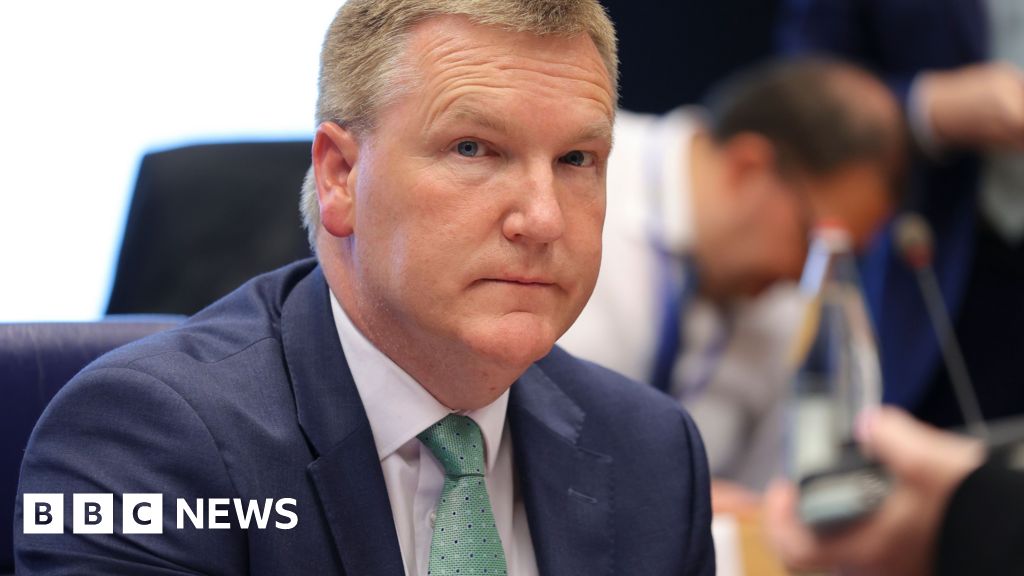
- auteur, John Campbell
- Rôle, BBC News NI Éditeur d'économie et d'affaires
Le gouvernement irlandais a déclaré qu’il s’attend à réaliser un excédent budgétaire de plus de 8 milliards d’euros (6,8 milliards de livres sterling) en 2024.
Cela équivaut à environ 3% du revenu national.
C’est la troisième année consécutive que le gouvernement reçoit plus d’impôts qu’il n’en dépense.
L'Irlande se trouve dans une situation inhabituelle : elle peut générer des excédents grâce à une manne exceptionnelle de recettes provenant de l'impôt sur les sociétés.
Le processus de création d’un fonds souverain utilisant certaines recettes fiscales exceptionnelles a commencé.
L’objectif est de créer un fonds doté d’actifs de 100 milliards d’euros (86 milliards de livres sterling) d’ici le milieu des années 2030.
Le ministre irlandais des Finances, Michael McGrath, a déclaré que le gouvernement espérait réaliser un excédent global de 8,6 milliards d'euros (7,4 milliards de livres sterling) pour cette année.
« Cela se base sur l'hypothèse que les recettes fiscales s'élèvent à environ 92,1 milliards d'euros, avec un taux de croissance de 4,6% », a-t-il précisé.
« Toutefois, je tiens à souligner que cet excédent dépend fortement des recettes volatiles de l’impôt sur les sociétés, qui sont passées de 4 milliards d’euros à 24 milliards d’euros en l’espace d’une décennie. »
Son ministère s'attend également à ce que l'économie intérieure irlandaise croisse de 1,9 % cette année et de 2,3 % l'année prochaine.
« Plutôt en bonne forme »
Les prévisions de cette année ont été légèrement révisées à la baisse depuis le budget d'octobre.
Le PIB irlandais est estimé à l’aide d’une mesure appelée demande intérieure modifiée (MDD).
Il exclut les effets de distorsion des multinationales sur la mesure du PIB en Irlande.
Le MDD a connu une croissance rapide après la pandémie, mais la croissance a ralenti à seulement 0,5 % l’année dernière, l’inflation et la hausse des taux d’intérêt ayant frappé le revenu disponible.
McGrath a déclaré que les éléments de preuve suggèrent que l’économie est « en assez bonne forme » et que certaines pressions inflationnistes devraient continuer à s’atténuer et « soutenir une reprise de l’activité économique ».
Il a ajouté que le « point économique le plus brillant » est le marché du travail, le pays devant rester au plein emploi technique dans un avenir prévisible.
Malgré de solides résultats économiques, la coalition au pouvoir en Irlande est en difficulté dans les sondages, car la hausse des coûts du logement et les services publics mis à rude épreuve signifient que de nombreuses personnes ont le sentiment de ne pas partager la prospérité du pays.

« Spécialiste de la télévision sans vergogne. Pionnier des zombies inconditionnels. Résolveur de problèmes d’une humilité exaspérante. »
-
entertainment2 ans ago
Découvrez les tendances homme de l’été 2022
-
Top News2 ans ago
Festival international du film de Melbourne 2022
-
Tech1 an ago
Voici comment Microsoft espère injecter ChatGPT dans toutes vos applications et bots via Azure • The Register
-
science2 ans ago
Les météorites qui composent la Terre se sont peut-être formées dans le système solaire externe
-
science3 ans ago
Écoutez le « son » d’un vaisseau spatial survolant Vénus
-
Tech2 ans ago
F-Zero X arrive sur Nintendo Switch Online avec le multijoueur en ligne • Eurogamer.net
-
entertainment1 an ago
Seven révèle son premier aperçu du 1% Club
-
entertainment1 an ago
Centenaire des 24 Heures – La musique live fournit une bande-son pour la course
